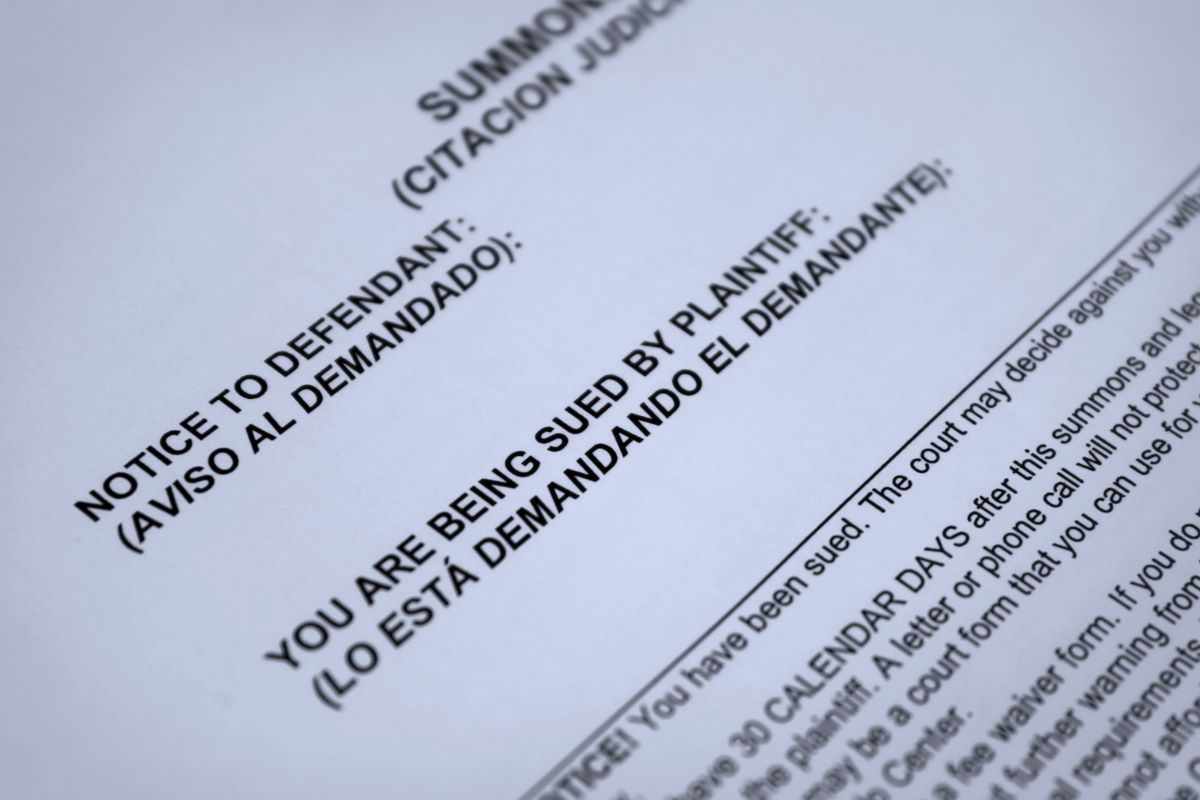Drafting an answer to a debt collection lawsuit is a scary proposition for most people—especially those who have not gone through the process before. While some debtors can’t afford an attorney, the reality is that you actually have some very powerful legal rights when it comes to dealing with debt collectors. This article discusses some common examples of affirmative defenses for filing an answer to a debt collection lawsuit.
What are affirmative defenses in debt collection lawsuits
Affirmative defenses are reasons or excuses why you should win your debt collection case. A properly asserted affirmative defense can help you win the lawsuit even if the plaintiff can otherwise prove the other elements of its case.
Timing is critical, however. You waive affirmative defenses by failing to raise them properly in your answer to a debt collection lawsuit complaint. This is why you must be careful in filing an answer. Leaving out certain affirmative defenses bars you from raising them later.
The party raising the affirmative defense also carries the burden of establishing it applies. You must therefore produce evidence that the affirmative defense applies and protects you from judgment.
What are 7 examples of affirmative defenses for answering a debt collection lawsuit
Rule 8 of the Utah Rules of Civil Procedure provides a partial list of examples of affirmative defenses available to win your debt collection lawsuit. Numerous other affirmative defenses might apply as well. Here are a few examples:
Statute of Limitations
Legally, a party can only assert its claims within a specific amount of time. The amount of time allowed is governed by the statute of limitations outlined by state law. In Utah, the following statutes of limitations generally apply. There are exceptions, however. Determining when the statute begins running can also be complicated. There are even ways to restart a statute of limitations on debt so rely on this list with caution.
- Most written agreements – six years
- Verbal agreements – four years
- Installment accounts – four years
- Enforcement of a judgment – eight years
Accord and Satisfaction
Accord and satisfaction is another example of an affirmative defense you can raise in answering a debt collection summons. The affirmative defense of accord and satisfaction is a legal concept that releases a party from an agreement when they have a disagreement about the contract but resolve that disagreement by agreeing to do something else to replace the original obligation.
To prove the defense of accord and satisfaction a defendant must prove the following elements:
- The parties had a dispute over the original agreement they resolved by entering into a new agreement, and
- The defendant fully performed his obligations under that new agreement.
When both of those elements are met, the defendant is released from his obligations under the original contract.
Mistaken Identity and Credit Fraud
You generally do not have to pay for a debt you did not incur. This applies to cases of credit fraud and mistaken identity. There are ways the creditors can trick you into paying these debts or even becoming responsible for the debts, however. To avoid that issue, keep a close eye on your credit accounts and credit reports. That way you can discover and correct theft or mistaken identity issues as quickly as possible.
Even after many years, there are techniques for assuring you are not held responsible for mistaken identity or credit fraud debts so contact an attorney if older accounts start coming out of the woodwork in collections or in your credit reports.
Improper Venue
Debt collectors may only sue you where the contract was signed or where you reside. Anywhere else is likely an improper venue. This allows the dismissal of the lawsuit in some cases and a change of venue in others. Improper venue is not just an example of an affirmative defense, however. Filing a debt collection lawsuit in an improper venue also violates the Fair Debt Collection Practices Act (FDCPA). Consult with an attorney for free if your debt collection case is filed in an improper venue.
Lack of Subject Matter Jurisdiction
The overwhelming majority of Utah debt collection cases must be filed in the district court. Debt collection agencies are strictly prohibited from pursuing assigned claims in small claims courts. That does not apply to original creditors however so payday lenders and other original creditors might sue in small claims courts.
Assignee may not file claim.
A claim may not be filed or prosecuted in small claims court by any assignee of a claim.
Utah Code Ann. § 78A-8-103
If a debt collector files a lawsuit against you in small claims court this statute is grounds for dismissal. It is also a violation of the Fair Debt Collection Practices Act that allows you to sue the collection agency. Get a lawyer right now if this is an issue in your case.
Statute of Frauds
The statute of frauds is a statutory requirement that certain agreements must be in writing to be legally enforceable. These include:
- every agreement that cannot be performed within one year from the making of the agreement;
- every promise to answer for the debt, default, or miscarriage of another;
- every agreement, promise, or undertaking made upon consideration of marriage, except mutual promises to marry;
- every special promise made by an executor or administrator to answer in damages for the liabilities, or to pay the debts, of the testator or intestate out of his own estate;
- every agreement authorizing or employing an agent or broker to purchase or sell real estate for compensation; and
- every credit agreement.
There are exceptions to the statute of frauds affirmative defense such as admitting the contract exists, partially performing under the agreement, and sending written confirmation of an agreement so use caution in determining whether this defense applies in your case.
When you are sued for a debt incurred by someone else, the statute of frauds should be carefully considered when filing your answer to a debt collection lawsuit. Yes, there are instances when certain family debts are your responsibility even when you don’t sign for those debts. Those circumstances are limited as are the remedies available under Utah’s family debt statute. Again, this is an area where a free consultation with a Utah consumer protection attorney is critical to properly asserting the affirmative defense.
Debt Fully Paid, Settled, or Discharged in Bankruptcy
Asserting payment or settlement of the debt is a common affirmative defense to assert when filing your answer to debt collection lawsuits. Most often, this comes up when the creditor fails to properly credit a payment or series of payments. The defense of a fully paid debt also arises when credit card companies don’t produce the full record of payments by the debtor. This example of an affirmative defense also applies to medical debts if insurance payments are not properly applied. Medical debts that should have been paid by worker’s compensation may also fall into this defense and violate the FDCPA.
Accounts discharged in bankruptcy are off-limits to debt collection agencies. Even before the discharge occurs the automatic stay prevents collections of bankruptcy accounts. In some chapter 7 bankruptcies, debts are automatically included even without being listed in the bankruptcy schedule. Even so, most bankruptcy attorneys will list the bad debt whether it’s a chapter 13 bankruptcy, a chapter 7 no-asset bankruptcy, or a chapter 7 bankruptcy involving assets. Even when the debt is not discharged in a chapter 13 bankruptcy due to failing to complete the plan, you should at least be given credit for the payments you made under the chapter 13 bankruptcy plan.
This is not just an affirmative defense. A debt collection agency violates the Fair Debt Collection Practices Act by filing a debt collection lawsuit for debt that was discharged in bankruptcy.
Affirmative Defenses are a Crucial Part of Your Answer to a Debt Collection Lawsuit
Raising one of these 7 affirmative defenses in your answer to a debt collection lawsuit is critical. Failing to raise the proper defenses or waiting too long will result in a waiver of the defense. Waiting also causes entry of judgment against you when the case should otherwise end up in your favor.
Rule 8 of the Utah Rules of Civil Procedure provides a list of examples of affirmative defenses to raise when answering your debt collection lawsuit. It includes accord and satisfaction, arbitration and award, assumption of risk, comparative fault, discharge in bankruptcy, duress, estoppel, failure of consideration, fraud, illegality, injury by fellow servant, laches, license, payment, release, res judicata, the statute of frauds, the statute of limitations, waiver, and any other matter constituting an avoidance or affirmative defense. That list of examples of affirmative defenses is not complete, however. Other defenses, including those listed above, might apply.
For your best results, consult with an attorney before filing your answer to a debt collection lawsuit. Remember, failing to include an affirmative defense waives the defense. That can kill your case. Additionally, it leads to a judgment against you that should have been dismissed. Don’t take the risk. Many attorneys provide a free consultation or case review. Most can also take your case on a contingency so you have little to no risk in hiring a qualified attorney.
Be our next success story!
Don’t answer your debt collection lawsuit alone. Contact us now for FREE to see how we can help.

